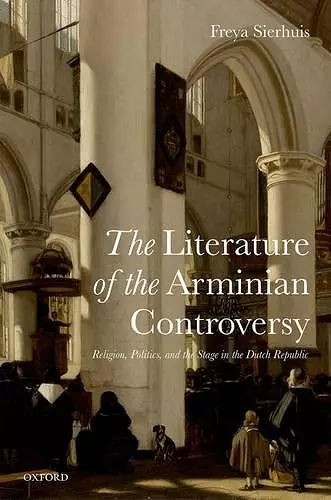The Literature of the Arminian Controversy
Religion, Politics and the Stage in the Dutch Republic
Format:Hardback
Publisher:Oxford University Press
Published:3rd Dec '15
Currently unavailable, and unfortunately no date known when it will be back

The Literature of the Arminian Controversy highlights the importance of the Arminian Controversy (1609-1619) for the understanding of the literary and intellectual culture of the Dutch Golden Age. Taking into account a wide array of sources, ranging from theological and juridical treatises, to pamphlets, plays and and libel poetry, it offers not only a deeper contextualisation of some of the most canonical works of the period, such as the works of Dirck Volckertz. Coornhert, Hugo Grotius and Joost van den Vondel, but also invites the reader to rethink the way we view the relation between literature and theology in early modern culture. The book argues how the controversy over divine predestination acted as a catalyst for literary and cultural change, tracing the impact of disputed ideas on grace and will, religious toleration and the rights of the civil magistrate in satirical literature, poetry and plays. Conversely, it reads the theological and political works as literature, by examining the rhetoric and tropes of religious controversy. Analysing the way in which literature shapes the political and religious imaginary, it allows us to look beyond the history of doctrine, or the history of political rights, to include the emotive and imaginative power of such narrative, myth and metaphor.
a very good book that offers stimulus to any scholar interested in literature, theology or politics, whether in the early modern or modern age. * David Onnekink, Utrecht University, Journal of Ecclesiastical History *
Such infelicities do not nullify the value of this text that is often informative and insightful, showing how the literary culture added fuel to an already raging fire. Anyone interested in the Dutch context of the Arminian controversy will benefit from this volume. * Keith D. Stanglin, Renaissance Quarterly *
The range of different sources and discourses Coster and Vondel made use of, clearly illustrates the interaction that existed between the ivory tower and Grub street; between theological treatises and academic writings on politics and history, on the one hand, and pamphlets, poems, plays, satire and libels, on the other. This interaction was not only intellectual. Sierhuis also unearths many personal connections that existed between members of the Academie and their more radical sympathisers, and the political and academic elite of the Dutch Republic. * BMGN- Low Countries Historical Review *
Erudite, authoritative and lucid, Freya Sierhuis's first book is a notable contribution to both the literary history of and historical scholarship on the Netherlands in the tumultuous first half of the seventeenth century. Providing a fresh perspective on the divisive Arminian controversy that tore apart the fledgling Dutch Republic between 1609 and 1619, it also lays down an important marker regarding the relationship between theology and imaginative writing, Latinate literature and vernacular pamphleteering, and ecclesiastical politics and libellous popular poetry and drama. * Alexandra Walsham, Journal of Dutch Literature *
Freya Sierhuis's remarkable ability to bring together the challenging theological and political issues of the day with the polemical satires of the popular press and the polished drama of the theatres makes her Literature of the Arminian Controversy a compelling and important contribution to our understanding of the Dutch Republic. * Andrew Fleck, Renaissance Studies *
Sierhuis's splendid analysis goes a long way toward illuminating the heart of the religious and political crises ignited by the Arminian controversy: the related battles over "predestination, the locus of sovereignty in the Republic, the relationship between the clergy and the civil magistrate, and the concomitant debates on liberty of conscience". It models theological precision in political historiography, and will prove useful to students and pastors, as well - not least for reminding its reader to register the dignity and danger of ideas at play in the contemporary public sphere. * Samuel Fornecker, Themelios *
... probably is the best account of the Arminian controversy in the English language to date. For that feat, Sierhuis should be congratulated. * Jaap Nieuwstraten, BMGN *
ISBN: 9780198749738
Dimensions: 241mm x 164mm x 25mm
Weight: 644g
308 pages